After experiencing some annoying performance issues on the PS4 version of Dark Souls III (including a framerate capped at 30 fps), I decided that I'd hold out the extra three days for the PC version of No Man's Sky. I assumed that the keyboard and mouse controls would be more comfortable, since the game is half shooter, half flight-sim. I assumed that the PC version would perform better and look better. And I figure that the game will eventually enjoy a vibrant modding community that is likely impossible to spring up on the PS4, since (as far as I know) the PS4 does not support modding in any way. I, once again, may have been wrong in my choice of platform.
In addition to having to wait three extra days for the game to release on PC, I've read a lot of reports of severe problems with the PC version of the game at launch. It simply won't run on certain machines with certain graphics cards. Many rigs have consistent performance issues. My PC is a few years old, but it more than meets the system requirements for the game, yet I've been stuck having to run it on medium graphics settings. Upping the settings to high only results in the game becoming unplayably slow whenever I step into the cockpit of my ship. I'm talking, like half a frame per second, and the game dropping all my inputs. The final insult is that the game breaks when you alt-tab out of it, which prevents you from alt-tabbing back into it. If you alt-tab out, you'll have to kill the process in task manager and restart the app - which, of course, will cause a loss of any progress since the last autosave. So despite having a dual-monitor set-up, I can't alt-tab out to open up podcasts or play some tunes while I warp around the galaxy.
Most of these problems will likely get fixed at some point (and some of them already have), and hopefully I'll be able to run the game at high graphics settings. But in the meantime, if you're interested in playing the game, then the PS4 version is probably the technically superior one right now. Apparently, the PS4 version also has numerous performance issues, including crashes.
Sadly, technical problems are only the beginning of my complaints with this game.
Betraying the naturalist within
Instead of being a game about exploring strange new worlds and discovering exotic wildlife and natural wonders of the universe (as I'd hoped), No Man's Sky turns out to be quite the opposite: a game about conspicuous consumption. The core game loop does not consist of landing on an alien world to explore and catalog the local flora and fauna. Instead, you land your ship in a vibrantly-colored patch of minerals and plants, and you begin strip-mining the site clean. You harvest the raw materials that you'll use to refuel your space ship so that you can warp to the next planet to strip its resources for more fuel.
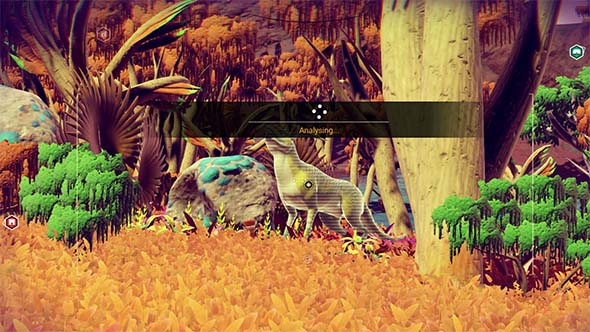
The incentives to catalog alien life feel extrinsicly-imposed and not a natural part of the core game experience.
Actually seeking out and cataloging the local wildlife takes a backseat - if you even bother to do it at all. The game isn't about that. There's nothing in the core gameplay loop or narrative that actually sets the game up to be about cataloging alien life. The only reason that the player has to even bother with scanning and analyzing is because you're rewarded with in-game currency for scanning stuff, even though there's no in-game reason (that I could discern) for why you would be getting paid to catalog alien life or who it is that's putting the money in your account. It all feels so thoroughly divorced from the rest of the game, and the money feels like an extrinsic incentive that is imposed from outside the scope of actual gameplay. In fact, I don't know why the game would have an in-game reason for why you would get paid to catalog stuff. After all, these planets are all already known by somebody in the game universe - they have space stations in every star systems and colony modules and trading posts on every planet long before you ever get there to "discover" them. So not only does cataloging life feel like an extrinsically-imposed mechanic, even this process of "discovering" feels completely fake and artificial.
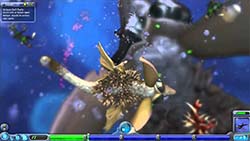
Comparisons to Spore are well-warranted,
but No Man's Sky isn't that bad.
Much like how Spore annoyed the naturalist within me by being a game about intelligent design rather than evolution by natural selection, the environmental conservationist within me cringes at the idea of No Man's Sky being more about stripping the local resources clean and moving on. I suspect that comparisons to Spore will likely abound. However, it is worth noting that No Man's Sky (as a whole) feels more competently put together than Spore felt. Spore felt like five disjoint mini-games lazily stitched together haphazardly with almost no relation to one another. The only one of those five mini-games that was even remotely fun was the microbe stage, which sadly only lasted about five minutes. No Man's Sky's distinct elements at least feel more or less seamless. That is, flying the spaceship, walking around the planets, and managing your supplies and inventory do not feel like they are completely different games the way that each stage of Spore felt.
Galactic Skinner Box
At the most basic level, No Man's Sky is a massive, galactic Skinner Box. The player is never more than a minute or two away from a "point of interest", and even the space between those points of interest is full of harvestable resources. Everywhere you go, there is basically a couple buttons that you press to get some small reward. It might be small amounts of resources, or it might be in-game currency, or it could be a tech upgrade, or it might be a new piece of vocabulary for one of the game's several alien languages. This is the same addiction-inducing design philosophy that casual and mobile games are based around, and which has been creeping into more of mainstream gaming. Whereas a successful casual game like Bejeweled manages to captivate the player with fun gameplay or puzzles, No Man's Sky has virtually nothing for the player to do other than walk/fly around collecting the little rewards that dot each star system. How long you remain addicted to the game will depend entirely upon how long those little rewards remain worthwhile, and how long the novelty of finding new planets remains captivating.
Most of the game consists of harvesting resources and collecting scraps of salvage from abandoned colonies.
Unfortunately, I don't think that will be very long. It didn't take long for me to start encountering repeated plant life and animal archetypes. In the first weekend of play, I had already seen what felt like the same desert planet with the same cactuses, giant mushrooms, and little dinosaur critters. The sameness of these planets also started to crack my suspension of disbelief. In addition to the flora, fauna, and landscape, each planet has its own "environmental hazard" - usually associated with some kind of climate condition. Some planets are blistering hot, other planets are freezing cold, some have toxic rain or radioactive atmospheres. These environmental conditions can cause some inconvenience for the player (usually by wearing down your life support more quickly), but they don't seem to have any influence on the planet's wildlife. The plants and animals that I saw didn't seem to be at all adapted to the environment in which they lived. The same flowering cactuses, mushrooms, and dinosaur critters were present whether I was on a +200° scorched "desert" or a -10° tundra "desert". The frozen desert planets didn't have any fuzzy, wooly critters running around that looked like they were adapted to cold temperatures. Heck, these planets don't even seem to have variable gravity. Whether you land on a full planet, or a smaller moon, your run speed, jump height and distance, and resource cost to land your ship and take off all seem to be identical, and the same types of life appeared on both planets and moons.
Environmental hazards can be mitigated by certain tech upgrades that you can apply to your exo-suit. I never bother with this though. Installing a tech upgrades eats up a valuable inventory slot, and the tech upgrades have never felt worth the inventory space that they consume. Keeping your life support topped off is easy enough by just mining the necessary plutonium that's usually littering the surface of planets, so these hazards rarely (if ever) put the player in actual danger (as long as you don't go scuba diving in an underwater cave), and they are all dealt with in exactly the same way. Ship upgrades feel similarly worthless. The only thing that I bother to put tech upgrades on is my multi-tool, since you can't store resources in the tool's inventory anyway. You either install tech on the multi-tool, or that space goes entirely wasted. Perhaps tech upgrades become more valuable later in the game if you have to do more combat?
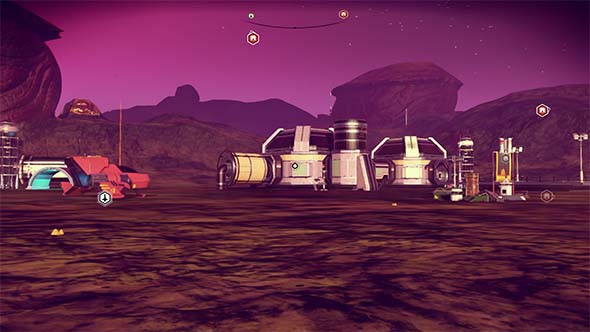
Every planet is littered with these virtually identical colony modules, but never any actual colonies or cities.
My suspension of disbelief was also shattered by the repetitive occurances of the same exact colony modules littering the surfaces of every planet (and their moons!). It's as if some massively-powerful alien race decided to send out small colony modules to every planet in the galaxy, stationed one guy in each one, but never bothered to actually colonize any of these planets. There's no cities or actual colonies anywhere in the game (that I've been able to find, anyway)! How do all of these space-faring civilizations exist if all the planets in the galaxy are abandoned? Is this maybe supposed to be the whole point of the game? Are we supposed to be wondering where all the advanced civilizations went? I mean, that's obviously what we're supposed to be wondering with the ruins and monoliths, but the colonial modules too? I don't know. The game's so big that I haven't actually "finished" it yet - assuming that finishing is something that you even can do.
Endless grind
Worse yet, is that even if the game can be beaten, I'm not sure that I'd ever want to. The whole game is just such a tedious, pointless grind.
One of the most annoying problem is that you can't scan for resources while in your ship (whether hovering 100 feet from the ground or from orbit). You, thus, have no idea if any given planet will even contain any given resource that you might be looking for, let alone where to actually go to look for it. This leads to cycles of landing, finding nothing useful, taking off again, and rapidly blowing through your landing thruster fuel, forcing you to have to stop and grind out some more plutonium (which thankfully, is usually readily available). If you end up being chased by hostile sentry bots or aggressive wildlife, and you run out of landing thruster fuel, you are kind of temporarily screwed. Your weapon recharge is fueled by the same plutonium that powers your landing thrusters. Which means that you can't be either stranded or out of ammo; you're always both! Why can't the landing thrusters be powered by dueterium or something? At least that would make water feel like it's useful. But then I guess every planet would need to have water on it in order to prevent the player from ever becoming absolutely stuck, and that would only serve to further limit the variety of the planets that can be generated.
Problems with landing are exacerbated by the fact that there is no free-look button (on PC), and you can't see what's directly below your ship. There's also no way to make your ship hover in place. Trying to accurately land next to a landmark or resource deposit is a crap shoot that leads to even more take-offs and landings as you struggle simply to land your ship where you want it.
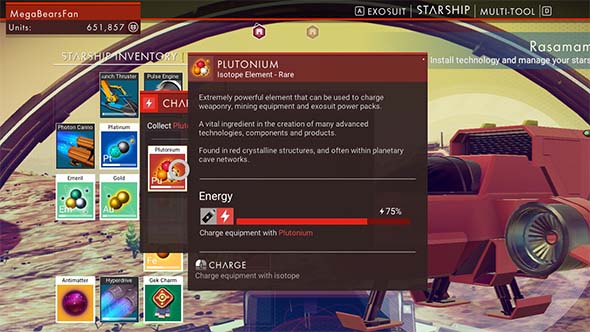
Launch thrusters eats up fuel faster than anything else, forcing you to constantly search for plutonium.
All of these problems with the fundamental gameplay are compounded by uncomfortable flying controls (in the PC version anyway). Flight sims have been around forever, so I don't know how Hello Games managed to screw that up. Somehow they did. Steering with the mouse results in a lot of oversteer (for lack of a better word), which makes precision flying and aiming during dogfights very difficult. Rotating the ship with the A and D keys always seemed to disorient me, especially since the game locks the ship at specific distances above the planet's surface. And why can't we strafe? This is a space-ship, not an airplane. Yeah, sure, it's a PC game, so we can re-map the buttons if we want. But the point is that we shouldn't have to!
Furthermore, even though the game is littered with trading posts and starbases and NPC ship captains to trade with, they never seem to have the item(s) that I want or need. And depending on how you explore, you may completely miss certain key recipes or blueprints. The warp map screen is also virtually impossible to navigate except for the purposes or proceeding closer to your objective(s). If you ever need to go back for any reason - like, say to collect resources or items that you know are on planets you've previously visited, or to return to your old ship because you decide you don't like your current ship, or because you want to finish scanning all the fauna in order to get the bonus for 100% completion of a planet, or because you missed a key recipe like the ones that allow you to craft friggin' antimatter - then you're basically screwed. The game doesn't leave a breadcrumb path for you to follow back to previously-explored planets, nor can you fast-travel to them (or even place waypoints on them) via the Discovery menu.
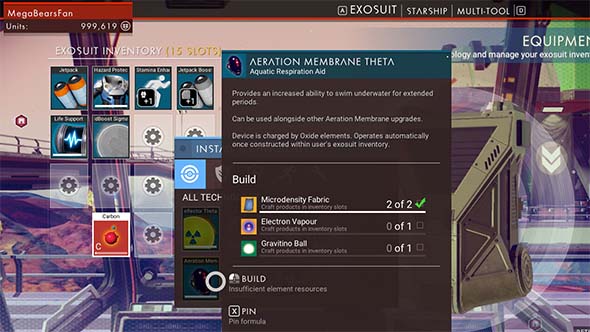
Good luck finding that one missing crafting component. You have a whole universe to search through!
And since your inventory space is so limited, and there's no infinite item box (which would be a handy use for starbases or trade posts), you never have the space to keep resources or intermediary crafting components. But if you don't craft an intermediary component now (even though you don't have the other materials needed to turn it into a more advanced craft), then you risk not being able to find the basic ingredients for those simpler intermediary parts later.
Then there's little annoyances like how you can't apply the components that you already have to repairing a ship system or crafting a tool unless you have all the parts necessary to finish the whole project. So you have to hold onto all the necessary components until you find the last little piece that you're missing. You also can't upgrade an existing item into another item in the same inventory slot. So going through the four-step process of crafting a Warp Cell (fuel for your warp drive) feels needlessly complicated. You have to first fill one inventory slot with carbon, then use another inventory slot to craft the carbon into Suspension Fluid, then fill the first inventory slot with plutonium, then craft the Suspension Fluid and plutonium into Electron Vapor in a third inventory slot, then fill two more inventory slots with heridium and zinc, combine those elements with the Electron Vapor to make Antimatter in another inventory slot, then fill one of your now-empty inventory slots with thamium9, and use the remaining empty inventory slot to craft the thamium and Antimatter into a warp cell. Now you can refuel your warp drive with the warp cell, which lets you perform all of one single warp jump. This is a process that requires at least four inventory slots (if you collect the new ingredients as you go), and at most seven (if you collect all the raw ingredients before starting). Phew...
Crafting a Warp Cell to refuel your warp drive is a four-step process requiring between 4 and 7 inventory slots!
And then there's the fact that there's nothing to do in between grinding for resources. You can get attacked by space pirates, but the combat mechanics are pretty crappy and mostly just an annoyance. I don't see any actual multiplayer, there's no faction system or intergalactic wars (that I saw). Some of this stuff was even promised and shown in pre-release videos as soon as a few months ago. It's all gone, which leaves nothing to do except for the resource grind.
The game also routinely wastes your time with its disruptive little "cutscenes" or letterboxing at save points, when you hit milestones, while you wait for dialogue text to scroll across the screen, or while you wait for a puzzle solution to tell you what it awarded you with. And you can't skip any of these things. And why the heck does every interaction with the game require that I hold the button for a whole second? It also insists on barking out warnings that your life support is low because it dips below 75%. 75% is not low!
So even though the core gameplay is pitifully simple and repetitive, the game is constantly putting up annoying little road blocks to slow down your progress. It's a nuisance, and it's a grind.
Making first contact
I was annoyed by the fact that the game doesn't bother to provide any context for who your character is, what you're supposed to be doing, or any background politics about the universe in which you live. I don't even know if my character is supposed to be human. It seems pretty clear that I'm not one of the several alien species that I run across, because I don't know any of their languages and don't understand their customs. And they all treat me like an alien.
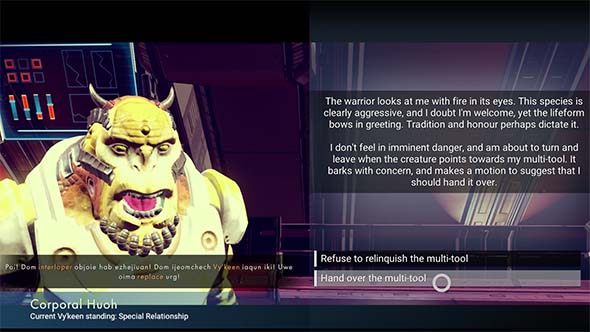
Learning alien languages word-by-word is a persistent puzzle - and another thing to grind.
Having to piece together alien languages, however, does end up being one of the most interesting parts of the game. Each encounter with an alien is a little puzzle in which the alien wants something, and you have to figure out how to please it. Since you don't know their language, the game gives you a little text prompt explaining the alien's body language and gestures. Sometimes, these hints are painfully obvious. Other times, you're reliant on looking at the few words that you can translate to try to get more clues about what to do to please the alien. The rest of the time, you just guess. And with only two or three options, guessing is a bit too reliable to make this feature feel as worthwhile or compelling as it should be. This mechanic extends to solving puzzles at the ancient ruin sites, monoliths, and some of the colonial infrastructure.
As much as I like the concept behind this feature, I do have to admit that the process of actually collecting the vocabulary quickly turns - like everything else in the game - into an absolute grind. You have to learn these words - from four different languages - one at a time! Even after days of time spent exploring, I still couldn't understand anything about what most aliens were saying.
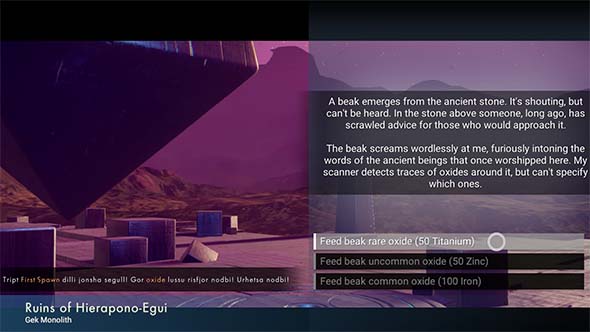
Ancient ruins will reward new words, and monoliths will provide additional language puzzles.
A beautiful, serene, but ultimately boring 'verse
I feel as if the original creative vision of a digital, extra-terrestrial safari was completely compromised in favor of trying to create a space-born Minecraft clone. But Hello Games completely forgot the part in Minecraft where you take all those resources that you painstakingly harvested, and use them to craft your own custom house, castle, or one-to-one scale replica of Minas Tirith - you know, the part of Minecraft that everybody actually likes. Granted, you're never on one planet in No Man's Sky long enough to warrant creating your own custom fortress, but the game could have at least given you a customizable starbase or something to act as a hub, or to let you completely custom-build your own spaceship from scratch.
I also think that the game could have benefited tremendously from more off-world activities. Space-faring life forms, anomalies to explore, nebulae, hazards like black holes, and so on, could have added a lot of variety and more opportunities to explore exotic phenomena. I fully suspect that if the game receives any expansions, then adding more content in space will be the prime focus of at least one expansion pack. Whether or not anyone will still care enough to buy any expansion packs is a different question...
I was really looking forward to No Man's Sky. As a Trekker / Trekkie, this game promised to be the most "Star Trek" game that's ever been released - in spirit, anyway, since it doesn't have the license for the IP. I was expecting a game that captures the spirit of discovery, and the wonder and marvel of nature in a full-scale universe. That might be buried somewhere in the depths of the game that was released, but you have to wade through a grind of resource harvesting and tedious crafting to get there. And even then, exploration for exploration's sake is mostly just a waste of time that has to be extrinsically motivated by offering in-game money as a reward for doing it. The end result is a boring grind, and an all-around bumbling game.
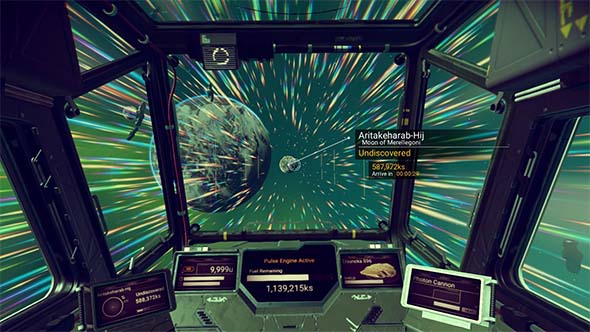
Planets and their moons are the only things in the universe to examine.